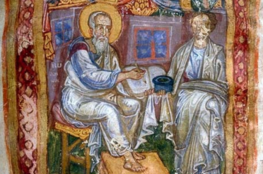A little more than a year ago I wrote an article for Crisis discussing what Catholics should not learn from the Eastern Orthodox Church. In it I called attention to the process of establishing a single American Orthodox jurisdiction and its unraveling after the Russian Orthodox Church Outside of Russia (ROCOR) took a walk. Now the Antiochians have joined them. There is a brief, but thoughtful, post on the matter over at the Byzantine Texas blog. As the author notes, an apparent lack of leadership on the part of the Ecumenical Patriarch with respect to Antioch’s grievances over the canonical situation in Qatar coupled with growing displeasure toward the Greek Orthodox Archdiocese of America appears to be at the root of Antiochian Archdiocese’s decision. Also possibly motivating the Antiochians is an unwillingness to break ties with their besieged Patriarchal church. Whatever deciding factors were involved, it seems like the promise (or the threat) of an authentic American Orthodox Church is a long ways away.
It is difficult to judge what effect continued jurisdictional disunity will have on Orthodoxy in America. As I also mentioned in my Crisis piece, one prominent ROCOR clergyman had speculated that his jurisdiction’s decision may have been motivated by the fact that some local Orthodox churches in America “have laymen in good standing, and even clergy, who are openly advocating for gay marriage, and proclaim that committed monogamous homosexual relationships are not sinful.” Rod Dreher, an Orthodox journalist and author of some notoriety, agreed with this observation in his post commenting on my article.
In theory, a unified Orthodox body could set the record straight on any number of controversies related to faith and morals which the Orthodox, for a variety of reasons, have not been able to address in a uniform manner. On the other hand, perhaps the more conservative clergy in ROCOR and other jurisdictions realize that “a little leaven corrupteth the whole lump.” Instead of faithful bishops and priests being able to still speak authoritatively to their flocks on traditional doctrine and morality, a unified American Orthodox Church could follow the abysmal Catholic practice of issuing wishy-washy statements with ambiguous passages that cloud the Church’s true teachings. At the same time, on the level of praxis, some American Orthodox may be understandably concerned that a “lowest common denominator” approach will be taken to matters like liturgy, marriage, and discipline.
None of this is to say that there may not be some less-than-noble interests behind both ROCOR and Antioch’s respective decisions. Chauvinism is still a real problem in Orthodoxy, not just in America, but around the globe. There is a still a surprisingly widespread belief within certain jurisdictions that they have a unique mission toward particular ethnic groups and that the other Orthodox bodies need to stay out of their business. Moreover, there is also considerable distrust to be found between so-called “cradles” and “converts.” There are more than a few “cradle Orthodox” who see the project of establishing an American Orthodox Church as a “convert project” with few, if any, legitimate ties to the (fraught and confusing) history of Orthodoxy in this part of the world.
All is not lost, of course. Orthodoxy, for better or worse, will continue to function much as it always has in America. In other words, the end is hardly nigh for the Orthodox Church’s future in the United States despite the Orthodox, like their estranged Catholic brethren, having a hard road ahead in a culture that is secularizing rapidly (if not radically). Further, there can be no doubt that cross-jurisdictional relations have improved dramatically over the past decade, as evidenced in part by the quick thawing of relations between ROCOR and the Orthodox Church in America. Still, perhaps it will be for the next generation of American Orthodox to refresh the unification project. Until then, we should all pray that the Orthodox remain faithful witnesses to the Gospel in the face of a society whose “values” have become so antithetical to the truth of Jesus Christ.




September 21, 2015
Sadly, I am not surprised. Orthodoxy has much to offer – God knows I’ve learned quite a bit from it. Its dependency on ethnic identity and apparent inability to establish an Orthodox Church in traditionally non-Orthodox countries is a major flaw which prevents it from filling the spiritual vacuum the Roman Church left when it went through its modernizations.
September 21, 2015
I’m in an Antiochian parish which is an ethnic grab bag, as are most Antiochian parishes at this point. In my limited experience, OCA parishes are not remotely Slavic. Even the Greeks in my area are hanging out the “Come And See” banners as more young families tell their priests they see no need to try and teach their children Attic Greek. I’ve never been to the ROCOR parish in my town but the Liturgy is entirely English and they are as out-married and assimilated as anybody. About the only thing left Russian is some of the food.
I once asked a Carpatho-Russian Orthodox online how much longer their Church was going to be “Carpatho-Russian.” Were they shipping over Carpatho-Russians? Arranging marriages? Never got an answer. I met a member of a Carpatho-Russian parish while he and his son were in town on a business trip and they visited our parish. I asked him what his connection was to his Carpatho-Russian parish and he told me he didn’t actually remember. He thought it was somebody on his mother’s side who may have been CR, or may have just started going to his home parish a couple of generations back.
I don’t think it can be fairly said that American Orthodoxy is dependent on “ethnic identity” at this point. I know there are some very insular Arab, Greek and Russian parishes out there but they are the exception. The Orthodox in America are opening up out of financial necessity.
September 21, 2015
Churches I have visited, in southeast PA, of the OCA and ACROD retain a pretty strong connection with their Carpatho-Russian roots (ACROD especially) but are at the same time pretty open to non-Slavs.
September 21, 2015
My experience with ACROD is they are very open to everyone. The parish I sometimes visit has a good representation of people from various backgrounds with the pastor being a convert.
September 21, 2015
My Mother’s parish, before she moved to California, and where she taught Sunday school for years is also a Rysin parish, and what Anthony has written is very, very true. Services have been in English now for more than two to three generations. The old animosity between Greek Catholics and Orthodox Greek Catholics is a thing of the past as well. Even older people only speak English. Nowadays even the priest speaks only English, the most that people know is perhaps a few phrases, such as “Slava Isusu Xristu..Slava na viki” and “Xristos rodiatsya…Slava yeho.” That’s about it. Any mention of returning to Slavonic is met with stares.
What is interesting is that there are few converts, they seem to prefer something a bit more exotic. And what one can say about Rysin churches is that they are not very exotic at all. I personally miss hearing the old ladies praying the rosary before mass.
September 21, 2015
I think the “rust-belt” churches generally tend to be down to earth places where flamboyant pretentiousness doesn’t get very far.
September 21, 2015
Dale, what you write are some of the reasons ACROD is my favorite Orthodox jurisdiction. They
September 21, 2015
Should mention that the Ruthenians began to use English in the 1920-30’s…long before anyone else, which is why it is so natural now. The simply plainchant melodies, sung by the whole congregation, sound very, very natural in English (perhaps this is also due to years of use). The more operatic music of the Russians simply sounds artificial in English…of course, that is only my personal opinion.
September 21, 2015
Ryan, very true. I now live in the American Southwest, the churches are very ethnic, and the convert ones are, in my limited experience, the most exotic places I have ever seen. When a small group of Anglicans in Las Vegas (where I no longer live having finished by post-graduate degree) tried to join the Antiochian western rite, none of the ethnic Orthodox or their clergy had a problem, the converts and two convert priests went nuts. The community joined Rome, absolutely shocked by the nastiness.
September 21, 2015
‘Ethnicity’ is such a multivalent concept in these discussions. Is it language? is it culture? is it liturgics and related? is it a connection with the home country? is it a certain hard to define spiritual style? is it about how a church, diocese, archdiocese is run? is it an excuse for a home country to exploit (or maintain connections with) its emigres for other, non-church reasons (geopolitics, money)? or is it simply that supporting local unity and autonomy feels too much like actively severing ties with back home, whether an historic and/or suffering mother church (Istanbul) or culture (Istanbul, Antioch)?
I know when I think of the cultural problem of being Orthodox its more around whether the service is in a language I understand and whether I am familiar with the liturgics, e.g., Greek or Slavic style, priestly prayers, where the bishops throne is, what music is used, how the entrances are done, communion practice, etc. I think converts too easily dismiss some of the other concerns, especially for those with strong, current ties back to Europe and the Levant. A Greek priest was asked why some Americans wanted to separate themselves from the Church of Constantinople, why they wanted to abandon her in her struggle to survive? That’s powerful, and I think much the same perspective could be heard in many other local churches, e.g., Antioch, Ukraine. It isn’t whether people want to unite, it’s whether they want to sever themselves first to do so. That issue has to be dealt with.
September 21, 2015
Once when visiting a city I do not really know, I called one of the OCA Romanian parishes, the priest asked if I was Romanian, when I replied I was not; he told me to go to the Episcopal Church! This was fairly recently. I think it is this type of ethnicity that is damaging to the Church, any church, not simply Orthodoxy.
But there is another issue as well. The wholesale Russification of OCA Ruthenian and Ukrainian parishes is another type of ethnocentric fixation on exteriors; or my favorite, the rejection of any tradition that is not founded upon Byzantine models, which borders not only on the pathological, but the heretical.
September 21, 2015
The answer is the same as it has always been: finding a structure whereby the mother churches and their ex-pats abroad retain ties while also building consistency and closer ties in the diaspora between co-religionists who have historically had little interaction. What that looks like is something like full autonomy with mother churches maintaining representation and involvement in that autonomous church and Synod – something not unheard of in the continuum of Orthodox ecclesiology. Why not let bishops rule over metochia or ‘ethinic’ micro-dioceses, participate in a Synod as full members, and have a ‘right of appeal’ in conflicts between ordinary diocesan bishops of one ethnicity or tradition and parishes and faithful of another? Isn’t that simply building in conciliarity? Connect the finances of a parish with its diocesan and ‘ethnic’ bishops, too, as a way to fund this protection and assistance. This would defuse any fears of 1) ‘domination’ by another ethnic group or 2) the cutting off of funds and connectivity between emigre communities and their homelands. These ‘ethnic’ episcopacies could also include a range of groups representing existing American Orthodox establishments and jurisdictions with particular histories, e.g., Bishops of South Canaan, Englewood, Jordanville, Libertyville, Sitka, etc. Commemorations at the Liturgy would start with the primate of the autonomous church, then the geographic bishop, then any appropriate ‘ethnic’ bishop; this is basically how ROCOR commemorates now, i.e., Patriarch of Moscow, First Hierarch, Diocesan bishop. While messier than straightforward unity, this would bring some order to what is already in place together with some measure of ‘protection’ from domination, separation, etc. This way, it doesn’t really matter which Patriarch is in charge of if we have autocephaly or not.
September 21, 2015
Not mentioned is that newer immigration is actually causing some parishes to revert to a more ethnic standard. The parish my Mother attended before her death, a Serbian one, was all English but has now reverted to Serbian, not even Church Slavonic.
In the Serbian parish in Las Vegas a few years ago, the parish council, controlled by Serbs sent a letter to all non-Serbs stating that the parish was a monument to the “Serbian race” and although those of us not of Serbian origin were still expected to pay our dues, we were not permitted to vote for parish council and that the services were to drop English and were to be all in Serbian. This action was supported by the Serbian bishop. This parish is now all-Serbian in ethnic composition as well as language. At the time I was the Church-Slavonic cantor, I was asked to leave since the Serbs did not want Slavonic but modern Serbian (I would have left anyway since I was a supporter of introducing more English, we are in America after all).
What was strange was that the majority of non-Serbs were not converts, but from other traditional Orthodox backgrounds. Most of the non-Serbs went to the OCA and founded a new parish, while some of the Ukrainians and Ruthenians went to the Greek Catholics. The local Greek parish has also been re-Hellenized as well because of new immigrants from the old country.
The Greek Catholic parish also has a new rush of recent immigrants from the old country, but the priest and their bishop has stood firm in the continued use of English and the welcoming of everyone.